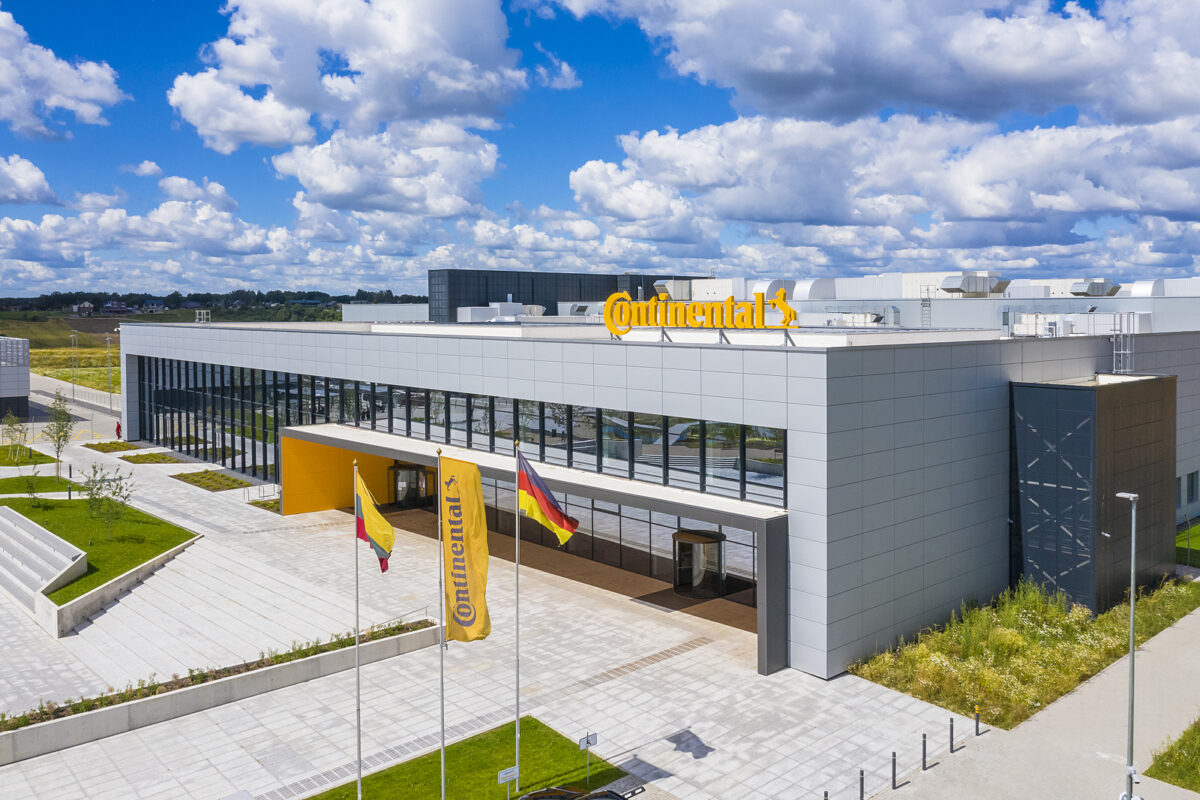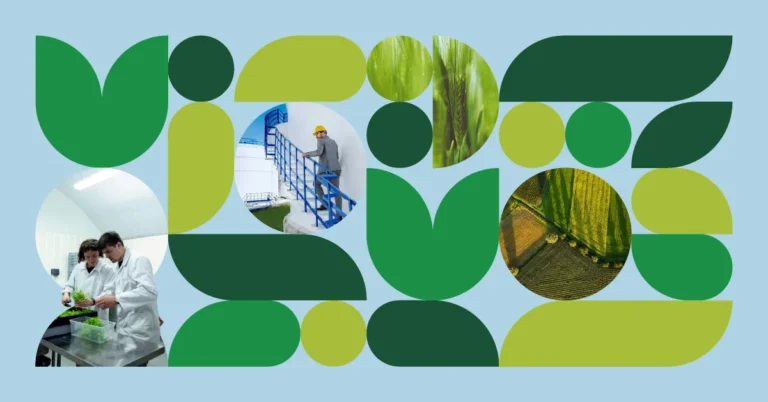Continental Automotive Lithuania announced today that its plant in Kaunas has been awarded LEED Gold. This is the highest rated LEED Gold manufacturing building in Lithuania so far and the first Continental plant in the world to be LEED Gold certified.
LEED (Leadership in Energy and Environmental Design), developed by the U.S. Green Building Council (USGBC), is one of the most widely used green building rating system in the world and an international symbol of excellence. Through design, construction and operations practices that improve environmental and human health, LEED-certified buildings are helping to make the world more sustainable.
“Proud to announce that Continental Automotive Lithuania Plant Kaunas has recently received the confirmation from U.S. Green Building Council (USGBC) that we have achieved a score of 70 to receive LEED Gold for our plant. This is an outstanding achievement since we beat the typical benchmark score of 60 and also were rated against the latest LEED v4 the next generation standard for green building design, construction, operations and performance requirement criteria for LEED,” – stated Shayan Ali, Managing Director of Continental Automotive Lithuania. “LEED certification is a globally recognized symbol of sustainability achievement and leadership. This achievement is working towards our plant vision: we bring together people, innovation and technology to deliver flawless mobility products, respecting the environment,”- said Shayan Ali.
LEED Gold certificate is a significant achievement not only for Kaunas Plant, but for Continental worldwide. Kaunas Plant is the first plant of Continental to be LEED Gold certified. “As stated by our CEO Dr. Degenhart, our goal is to create value sustainably. As Continental’s solutions, components and systems are found in three out of four cars worldwide, company is the key part of the whole mobility system and the leading force towards transformation. One of the key points in Continental’s Environmental Strategy Roadmap 2030 is enhancing climate, water and resource efficiency. This is a firm commitment across the entire company and LEED Gold award is a perfect illustration for the effort,”- explained Shayan Ali.
Continental Automotive Lithuania achieved LEED certification for implementing practical and measurable strategies and solutions in areas including sustainable site development, water savings, energy efficiency, materials selection and indoor environmental quality. Green buildings allow companies to operate more sustainably and give the people inside them a healthier, more comfortable space to work. “I am very happy that Continental trusted us and gave an opportunity to implement a project of such high standards for innovation and sustainability. By combining elaboration of detailed BIM (Building Information Modeling) model creation, together we managed to create the top rated green and sustainable manufacturing building ever built in Lithuania. With a result of 70 points, it became country’s first building to have such a high score in LEED v4 version.” – said Darius Kvedaras, Managing Director of Baltic Engineers.
“Achieving LEED certification is more than just implementing sustainable practices. It represents a commitment to making the world a better place and influencing others to do better,” said Mahesh Ramanujam, President and CEO, USGBC. “Given the extraordinary importance of climate protection and the central role buildings play in that effort, Continental Automotive Lithuania is creating a path forward through their LEED certification.”
Innovative Solutions for Sustainability
To receive a LEED certificate, Continental had to firstly present the plant project plan to be reviewed and certified. Later the finalized building is audited again to ensure the compliance to the project presented and to the LEED requirements are fulfilled. LEED v4 is grading a project in 8 major Categories such as Integrative Process, Location and Transportation, Sustainable Sites, Water Efficiency, Energy and Atmosphere, Materials and Resources, Indoor Environmental Quality, Innovation. Multiple new and innovative solutions were used for the purpose of the compliance to the LEED certification requirements in Kaunas plant project.
Company had to ensure the involvement of the multiple specialists during regular Design Charette meetings to receive maximum points in Integrative Process category. In Location and Transportation category project received the points for selecting the investment site in the area of low environmental impact. As well points were added for limiting parking places, creating special zones for carpooling users and low-emitting vehicles, and installing numerous charging stations for electric vehicles.
Kaunas plant scored maximum points in Water Efficiency category. Ultra low-flush and low-flow fixtures were used to reduce indoor water consumption, achieving over 55 percent reduction from the baseline. Outdoor water usage was also greatly reduced by setting out of native and adaptive plant species for project landscaping with no permanent irrigation system required.
Within Energy and Atmosphere category 27 out of 33 points were awarded. Continental building achieved an impressive result of over 51% energy cost savings compared to baseline building in the same climate zone and maximum points were awarded for energy optimization. To ensure that the energy in the building can be utilized as efficiently as possible, an energy simulation was performed as early as the conceptual phase, which was then used as a basis for specifically selecting energy-efficient solutions and materials. The plant is a so-called smart building that has fully integrated building management and energy management systems, which automatically controls building parameters based on real-time demand. Plant has its own cogeneration plant, high-performance envelope, high-efficiency HVAC systems partnered with smart controls and advanced metering to further reduce a building’s energy use.
Furthermore, the selection of construction materials has focused not only on technical suitability, but also on good performance in a detailed life cycle analysis conducted by the Baltic Engineers. The whole-building cradle-to-grave life-cycle assessment (LCA) conducted for the project’s structure and enclosure demonstrated between 12% and 30% reduction within six impact categories, compared with a baseline building of the same size, function, orientation, service life, and high operating energy performance. For example, the project achieved over 12% impact reduction for Global Warming Potential (GHG) and over 30% reduction for Stratospheric Ozone Depletion. In order to lower construction impact, over 98% of the construction waste has been diverted from landfill.
The project achieved Exemplary Performance for implementing additional enhanced indoor air quality strategies and maximum interior lighting points for providing advanced lighting control and high-quality LED lighting sources. Interior surfaces have a high reflectance making the spaces brighter and the contrast between work surfaces and wall surfaces has been minimized to create a more comfortable and productive environment.
Multiple studies showed that employees are more productive and express higher job satisfaction in LEED Certified buildings in comparison to the conventional buildings. Certification is proof that buildings are going above and beyond to ensure the space is constructed and operated to the highest level of sustainability. More than 203,000 commercial and institutional projects are currently participating in LEED, in more than 180 countries.
Continental develops pioneering technologies and services for sustainable and connected mobility of people and their goods. Founded in 1871, the technology company offers safe, efficient, intelligent, and affordable solutions for vehicles, machines, traffic and transportation. In 2019, Continental generated sales of €44.5 billion and currently employs more than 230,000 people in 59 countries and markets.












